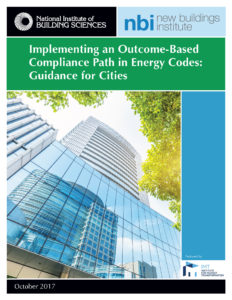 Outcome-Based Path for Codes Focuses on Results, Looks at Building’s Actual Performance
Outcome-Based Path for Codes Focuses on Results, Looks at Building’s Actual Performance
A number of cities and states across the United States have begun to recognize that the current code-based mechanisms in place do not provide the means to help them achieve their energy performance goals for buildings. Codes largely focus on design requirements for a limited number of building characteristics, but do not require verification that the design results in actual, measurable energy savings. That is why the National Institute of Building Sciences (NIBS) and the New Buildings Institute (NBI) developed Implementing an Outcome-Based Compliance Path in Energy Codes: Guidance for Cities, released today. This guidance document provides jurisdictions with a new approach to shift the focus towards actual, measurable energy results so they can begin impacting energy influencing measures not currently included in the nation’s model energy codes.
Most jurisdictions across the nation use a prescriptive or performance-based pathway to achieve their energy-efficiency requirements. For years, NIBS and NBI have worked to address the actual, measured energy performance of buildings across their life cycle. They have submitted code change proposals through the ASHRAE and International Code Council code development processes to establish an outcome-based compliance path within the model codes. While developing the guidance document, they received feedback from industry stakeholders representing numerous aspects of the industry.
Implementing an Outcome-Based Compliance Path in Energy Codes: Guidance for Cities provides jurisdictions with the regulatory language to put an outcome-based compliance path into place. Jurisdictions can use the draft regulatory language as a framework around which they can begin to align their high-level energy goals through their building codes.
The guidance document, which is available free to jurisdictions, includes code language that can be incorporated directly into a jurisdiction’s energy code.
Jurisdictions interested in starting on the outcome-based path to achieving energy goals, can download Implementing an Outcome-Based Compliance Path in Energy Codes: Guidance for Cities now at https://newbuildings.org/resource/implementing-outcome-based-compliance.
-30-
Contact:
Stacey Hobart, New Buildings Institute
stacey@newbuildings | 503-407-2148
About the New Buildings Institute
New Buildings Institute (NBI) is a nonprofit organization working to improve the energy performance of commercial buildings. NBI works collaboratively with commercial building market players-governments, utilities, energy efficiency advocates and building professionals-to remove barriers to energy efficiency including promoting advanced design practices, improved technologies, public policies and programs that drive energy efficiency. Learn more at https://newbuildings.org.
About the National Institute of Building Sciences
The National Institute of Building Sciences, authorized by public law 93-383 in 1974, is a nonprofit, nongovernmental organization that brings together representatives of government, the professions, industry, labor and consumer interests to identify and resolve building process and facility performance problems. The Institute serves as an authoritative source of advice for both the private and public sectors with respect to the use of building science and technology. Learn more at www.nibs.org.
